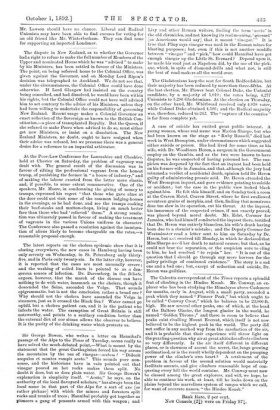The dispute in New Zealand, as to whether the Governor
had a right to refuse to make the full number of Members of the Upper and nominated House which he was " advised " to make by his Ministers, has been settled in favour of the Ministers. The point, on being referred home to the Colonial Office, was given against the Governor, and on Monday Lord Ripon's decision was telegraphed to Auckland. We do not see that, under the circumstances, the Colonial Office could have done otherwise. If Lord Glasgow had insisted on the country being consulted, and had dissolved, he would have been within his rights, but the Colonial Office could not have well advised him to act contrary to the advice of his Ministers, unless they had been willing to undertake the responsibility of governing New Zealand. Recent usage makes a Colonial Governor an exact reflection of the Sovereign as known to the British Con- stitution,—a piece of transplanted Royalty. But the Queen, if ehe refused to make Peers when advised to do so, must either get new Ministers, or insist on a dissolution. The New Zealand Ministers, no doubt, ought to have resigned when their advice was refused, but we presume there was a general desire for a reference to an impartial arbitrator.


































 Previous page
Previous page